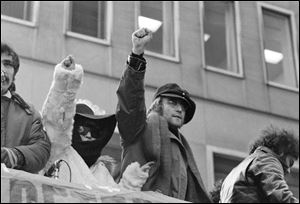
Movie review: The U.S. vs. John Lennon **
11/3/2006
John Lennon and his wife, Yoko Ono, raise their fi tsts as they join a protest Feb. 5, 1972, in front of British Overseas Airways Corp. offices in New York.
The reporter wouldn't budge.
Having left the Beatles only months earlier, John Lennon was now a peace activist, but the reporter wasn't buying it. Yet that's who he was, he insisted. Never mind he had told Dick Cavett "I'm an artist first and a politician second." Lennon was famously (and honestly) contradictory and mercurial, and now he was an anti-war activist. He was speaking out against the Vietnam War. He wouldn't back off. "I've grown up," he told her.
"But you're making yourself ridiculous," came her response.
It's a brutal exchange for a celebrity chat - the reporter was from the New York Times - and somewhat emblematic of the failure of the new documentary The U.S. vs. John Lennon. It provides oodles of great footage in the service of moldy assumptions that could use a rigorous poking every now and then. The reporter is a boob for not accepting Lennon's political commitment or his grasp of the issues, and Lennon is a hero for committing his life to promoting a peaceful world and therefore, not to be questioned.
It's pure hagiography.
In fact, the point (if I'm not too naive myself) is that Lennon was more credible than anyone in the Nixon administration, which unsuccessfully tried to deport him for three years. The movie tells the story of those deportation trials and his time as lightning rod for controversy. But then, of course Lennon was a more engaged human being, a more passionate thinker, less cynical about accomplishing good, more charming, and he had more No. 1 hits than Nixon.
The film is an affectionate reminder of how vital Lennon was, romantic and idealistic and funny and frustrating. But does Lennon - as alive as ever, 26 years after his assassination on a New York City street corner - even need our help? The man is an unofficial saint and cultural touchstone. What's disappointing about The U.S. vs. John Lennon is how tantalizingly close it comes to being a complicated portrait of the artist as a young radical - with Lennon's ambivalence about that career move and all.
But the last thing we need is an iPod-Shuffle playlist of Lennon's most-familiar solo work providing the soundtrack to a coronation and newsreel mash of Kent State, the Martin Luther King, Jr., killing, the '68 Democratic convention in Chicago, and, yes, the Beatles.
Produced by VH1, no less.
The film opens in 1971, at Crisler Arena in Ann Arbor. Lennon appears at a benefit concert for John Sinclair, the White Panther leader and impresario behind Detroit-area punk pioneers the MC5. Sinclair became a cause celebre after selling an undercover cop two joints and receiving a 10-year jail sentence. From then on, Lennon was closely watched by the FBI, wire-tapped, followed by unmarked cars, and obsessed over within the walls of the White House, which saw him as a rallying point for young people, and thereby a threat to Nixon's upcoming 1972 presidential bid.
If directors David Leaf and John Scheinfeld have uncovered anything revelatory, it's firsthand confirmation of that White House obsession from the FBI agents who did the trailing (and a decidedly unrepentant G. Gordon Liddy). There's Nixon aide John Dean to say Lennon's sometimes avant-garde political theater with wife Yoko Ono was driving Tricky Dick to distraction. There's a stellar assembly of talking heads - Angela Davis to Gore Vidal, Tariq Ali to Walter Cronkite. As firebrand filmmaking goes, it's baby boomer cozy.
There's little of the critical mind that made Lennon so endearing. In the most confounding moment, the song "Revolution" is used as radical rhetoric - a song explicitly about resisting knee-jerk reactions. Lennon was never so pompous. He understood brilliantly how to leverage media attention to shine a light on a cause. But he could also be silly and naive and this picture is as unquestioning and assuming as Lennon tended to be unassuming and ambivalent.
"When I sing 'I Want to Hold Your Hand' hundreds of millions of people hear that," Lennon said. "So what if I decide to sing 'Give Peace a Chance' instead?" It's not a critic's role to suggest the movie they wish they'd seen. But there's a fascinating film in that quote, about a musician who drifted from radical politics to self-reflection. Was he really a threat to Nixon? Can a pop singer change the world? You can't prove it, and Lennon never did, but it's worth a good argument.
Contact Christopher Borrelli at: cborrelli@theblade.com
or 419-724-6117.